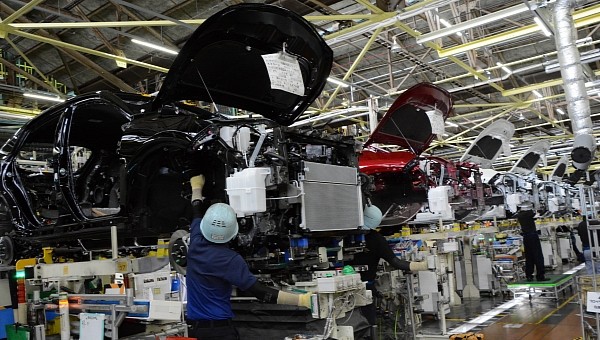Unless you live in a cave and out of touch with the outside world, you are no doubt familiar with the chorus ringing out from automobile manufacturers regarding production problems. Parts shortages, supply chain disruptions, and shipping delays have all played a part in hamstringing automotive production over the last couple of years.
From legacy automakers such as Ford and Volkswagen to startups like Rivian and Lucid, it seems they have all been affected to some degree. Oddly enough, we have not heard much in the way of belly-aching from the world's No.2 manufacturer, Toyota.
The Aichi, Japan-based global automaking behemoth just seems to keep on keeping on, seemingly unaffected by the state of supply chains. Toyota has always been a bit different in terms of how it manufactures vehicles and manages supply chains and operations. They may be less reliant on JIT inventory than others by having deeper in-house inventory levels.
Whatever Toyota does differently, it's working out very well. In fact, November numbers have just been released and they reveal the company outperformed itself from a year earlier in terms of global sales and production. A total of 796,484 Toyota vehicles were rung up in November, with sales outside of Japan reaching 686,499. With Hino and Daihatsu included, the company sold a record 884,112 vehicles.
November was the fourth consecutive month of year-over-year (YoY) sales gains. Worldwide production totaled 982,552 vehicles, also the fourth consecutive month of YoY increases.
Toyota had previously planned on manufacturing 9.7 million vehicles in the 2022 fiscal year but did pare that back in November because of rising material costs and a semiconductor shortage. Despite those factors, the company had registered production of a little over 8.3 million cars from January to November.
A couple of weeks back, the company stated its plans to produce 700.000 vehicles globally in January of 2023, despite a couple of temporary suspensions of production at facilities that produce the Land Cruiser and 4Runner models.
A lion's share of Toyota's sales can be attributed to the U.S. market, where Toyota has a huge manufacturing presence. The popular RAV4 is assembled in Kentucky, while the Highlander takes shape in Indiana, among others. It also shortens its supply chain by manufacturing components for vehicles throughout the country.
A subsidiary called TABC, Inc. formed way back in the early 70s during its push for continuous quality improvement, manufactures catalytic converters, steering columns, and stamped parts. Toyota Motor Manufacturing in Missouri makes aluminum castings, while facilities in West Virginia and Alabama make engines and transmissions in support of its U.S. operations.
In addition, to the U.S., Toyota assembles its Tundra pickup south of the border in Mexico and makes aluminum wheels, and assembles the RAV4 north of the border in Canada.
The Aichi, Japan-based global automaking behemoth just seems to keep on keeping on, seemingly unaffected by the state of supply chains. Toyota has always been a bit different in terms of how it manufactures vehicles and manages supply chains and operations. They may be less reliant on JIT inventory than others by having deeper in-house inventory levels.
Whatever Toyota does differently, it's working out very well. In fact, November numbers have just been released and they reveal the company outperformed itself from a year earlier in terms of global sales and production. A total of 796,484 Toyota vehicles were rung up in November, with sales outside of Japan reaching 686,499. With Hino and Daihatsu included, the company sold a record 884,112 vehicles.
November was the fourth consecutive month of year-over-year (YoY) sales gains. Worldwide production totaled 982,552 vehicles, also the fourth consecutive month of YoY increases.
Toyota had previously planned on manufacturing 9.7 million vehicles in the 2022 fiscal year but did pare that back in November because of rising material costs and a semiconductor shortage. Despite those factors, the company had registered production of a little over 8.3 million cars from January to November.
A couple of weeks back, the company stated its plans to produce 700.000 vehicles globally in January of 2023, despite a couple of temporary suspensions of production at facilities that produce the Land Cruiser and 4Runner models.
A lion's share of Toyota's sales can be attributed to the U.S. market, where Toyota has a huge manufacturing presence. The popular RAV4 is assembled in Kentucky, while the Highlander takes shape in Indiana, among others. It also shortens its supply chain by manufacturing components for vehicles throughout the country.
A subsidiary called TABC, Inc. formed way back in the early 70s during its push for continuous quality improvement, manufactures catalytic converters, steering columns, and stamped parts. Toyota Motor Manufacturing in Missouri makes aluminum castings, while facilities in West Virginia and Alabama make engines and transmissions in support of its U.S. operations.
In addition, to the U.S., Toyota assembles its Tundra pickup south of the border in Mexico and makes aluminum wheels, and assembles the RAV4 north of the border in Canada.






